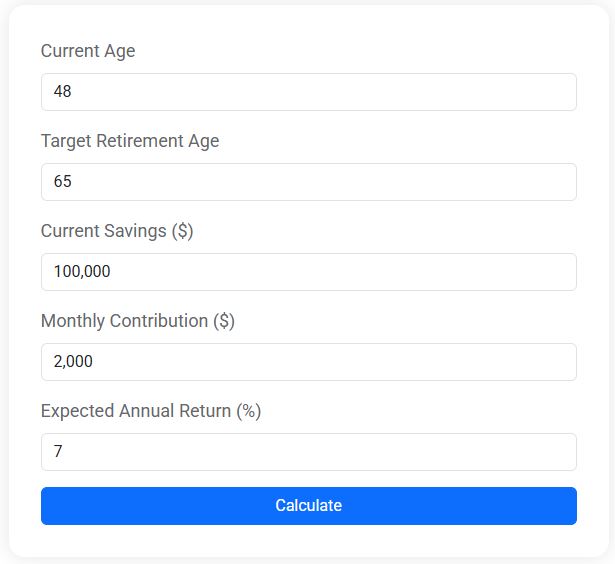Retirement and Taxes: What You Need to Consider

As you prepare for retirement, it’s important to understand how taxes will affect your various income sources, such as Social Security, retirement account withdrawals, and pensions. While tax-deferred accounts like traditional IRAs offer benefits during working years, they will be taxed upon withdrawal, unlike Roth accounts, which provide tax-free income. Additionally, consider state tax implications and develop a thoughtful withdrawal strategy to minimize your tax liability and maximize your savings.
Retirement is a time to kick back and enjoy the fruits of your labor, but the financial landscape during these golden years isn't always as carefree as it seems. One of the most important, yet often overlooked, aspects of retirement planning is understanding how taxes will impact your income. From Social Security and pension plans to withdrawals from retirement accounts, each source of income can be taxed differently, and these tax implications can significantly affect your overall financial well-being.
Navigating the tax landscape in retirement requires a strategic approach. It’s not just about knowing what you’ll owe, but also about making informed decisions that can help minimize your tax liability. By considering the tax treatment of your various income sources and understanding the different tax rules, you can better prepare for a financially secure retirement.
Understanding Social Security Taxes
Social Security benefits can be a lifeline in retirement, but they aren’t always tax-free. Whether your benefits are taxable depends on your total income. According to the IRS, if you file as an individual with a combined income (defined as your adjusted gross income plus nontaxable interest plus half of your Social Security benefits) between $25,000 and $34,000, up to 50% of your benefits may be taxable. Exceeding $34,000 could mean up to 85% of your benefits are subject to tax.
For married couples filing jointly, these thresholds increase to a combined income between $32,000 and $44,000 for up to 50% taxation, and over $44,000 for up to 85% taxation. It’s crucial to plan for these potential taxes as they can reduce the net benefits you receive. Keeping an eye on your income sources and how they affect your Social Security taxation can help in crafting a more tax-efficient retirement strategy.
The Tax Implications of Retirement Account Withdrawals
Retirement accounts like traditional IRAs and 401(k)s offer tax-deferred growth, which is a boon during your working years. However, this tax deferral means withdrawals in retirement are subject to ordinary income tax. The timing and amount of these withdrawals can significantly impact your tax bill. Once you hit the age of 73 (as updated in the SECURE Act 2.0), you must start taking required minimum distributions (RMDs) from these accounts, which can elevate your taxable income.
On the flip side, Roth IRAs and Roth 401(k)s, though funded with post-tax dollars, allow for tax-free withdrawals, provided certain conditions are met. This distinction can be a powerful tool in managing tax liability. For example, strategically withdrawing from a Roth IRA during a high-income year can help keep you in a lower tax bracket. As financial planner Robert Smith suggests, “A mix of account types provides flexibility to manage your taxable income and potentially reduce your tax burden in retirement.”
Early Retirement Calculator
Thinking about retiring early? Our free Early Retirement Calculator helps you figure out exactly how much you need to save and invest to reach financial freedom sooner. Whether you're aiming for early retirement at 55, 50, or even 40, this tool gives you a personalized projection based on your current savings, monthly contributions, and expected return on investment. Start planning your path to financial independence today.
Pension Income and Taxes
Pension income is generally subject to federal income tax, much like wages. Some states also impose taxes on pension income, while others exempt it. For instance, states like Illinois and Mississippi do not tax pension income, which can be a significant consideration when deciding where to retire.
If you have the option to choose between a lump sum payout or regular pension payments, each has its own tax implications. A lump sum can push you into a higher tax bracket, resulting in a larger tax liability in the year received. Regular payments, on the other hand, provide more predictable income and tax treatment, which can be easier to manage. Understanding how your pension income fits into your overall tax picture is critical to making informed decisions.
State Taxes and Retirement
State taxes can be a game-changer in retirement planning. While some states have no income tax at all, others tax retirement income quite heavily. If you’re considering relocating in retirement, it’s worth researching how different states tax income, including Social Security, pensions, and retirement account withdrawals.
For example, Florida and Texas do not have a state income tax, making them attractive options for retirees looking to keep more of their income. However, other factors such as sales tax, property tax, and cost of living should also be considered. As Kiplinger notes, “Retiring to a tax-friendly state can save thousands of dollars annually, but it’s important to look at the whole financial picture.”
Developing a Withdrawal Strategy
A thoughtful withdrawal strategy can help you manage taxes effectively in retirement. One popular approach is the "bucket strategy," which involves segmenting your assets into different "buckets" based on when you expect to need the money. This can help manage tax implications by allowing you to draw from the most tax-efficient source at any given time.
For instance, in years with higher expenses, you might withdraw from a Roth IRA to avoid pushing yourself into a higher tax bracket. Conversely, in years with lower expenses, it might make sense to take additional distributions from traditional retirement accounts to take advantage of lower tax rates. As financial advisor Jane Doe explains, “The key is flexibility. Being able to adapt your withdrawal strategy to your income needs and tax situation is essential for long-term success.”
Charitable Contributions and Tax Deductions
If philanthropy is a part of your retirement plan, charitable contributions can also serve as a tax planning tool. Donating directly from your IRA through a Qualified Charitable Distribution (QCD) can satisfy your RMD requirement while excluding the amount from your taxable income. This can be particularly beneficial for reducing your taxable income and keeping your Medicare premiums in check.
Moreover, under the current tax laws, charitable contributions can be itemized if they exceed the standard deduction, potentially lowering your taxable income further. It’s a win-win situation that benefits both your financial plan and the causes you care about.
Planning for Medicare Surcharges
While not a tax in the traditional sense, Medicare surcharges, known as Income-Related Monthly Adjustment Amounts (IRMAA), are additional costs that can catch retirees off guard. These surcharges are based on your modified adjusted gross income from two years prior. If your income exceeds certain thresholds, you may pay more for Medicare Part B and Part D.
Strategic income management, such as controlling the timing of Roth conversions or capital gains, can help mitigate these surcharges. As AARP highlights, “Anticipating and managing your income to avoid Medicare surcharges can save you hundreds, if not thousands, in healthcare costs annually.”
In the end, the intersection of retirement and taxes is a complex but navigable landscape. By understanding the tax implications of your income sources and being proactive in your planning, you can minimize your tax liability and keep more of your hard-earned savings. With the right strategy, you can enjoy a more financially secure and fulfilling retirement.








